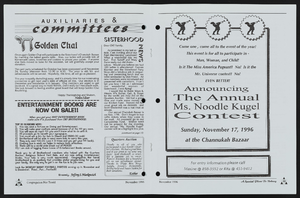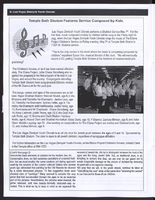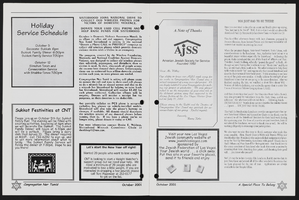Search the Special Collections and Archives Portal
Search Results
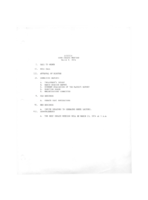
Meeting minutes for Consolidated Student Senate, University of Nevada, Las Vegas, March 9, 1976
Date
Archival Collection
Description
Text

Alan Stock oral history interview: transcript
Date
Archival Collection
Description
Oral history interview with Alan Stock conducted by Barbara Tabach on December 27, 2017 for the Remembering 1 October Oral History Project. In this interview, Alan Stock discusses moving to Las Vegas, Nevada in 1999 for his job as a radio talk show host for KXNT. Stock describes the broadcast that covered the October 1, 2017 Las Vegas mass shooting from 11 PM on that night until 9 AM the next morning. He talks about some of the calls the station received from various members of the community, including survivors of the shooting, families of those at the event, people on lockdown in the nearby hotels, doctors, and general listeners. Stock describes some of the topics discussed on the broadcast, such as what was currently happening on the Las Vegas Strip, stories of the aftermath, and the support needed from the general public. Other topics include gun control and conspiracy theories. He discusses the impact this and other shootings would have on public affairs, including tighter security in daily living and public gatherings. He compares security in the United States to security in Israel and other countries, focusing on the idea of unconcealed guns worn in public. Throughout this interview, Alan Stock explains that the radio station's goal was to provide accurate information to the public during the aftermath of the October 1, 2017 mass shooting.
Text
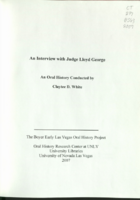
Transcript of interview with Judge Lloyd D. George by Claytee D. White, June 15, 2005
Date
Archival Collection
Description
Text
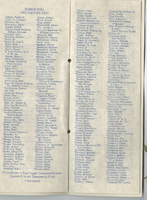
LVCJA Ball programs and planning documents, item 02
Description
Program for the Silver Anniversary Ambassador's Ball at Caesars Palace in Las Vegas, Nevada.

Transcript of interview with Ernie Hensley by Lisa Gioia-Acres, Janurary 25, 2008
Date
Archival Collection
Description
Ernie Hensley, an accomplished African American musician, was born in Washington D.C. on March 14 1940, the son of Ernest W. Hensley Jr. and Gladys Barbara Hensley. Both of his parents worked for the federal government in the nation's capital. Ernest W. Hensley Jr., was an employee at the Department of Defense and Gladys Barbara Hensley mother, who was an excellent pianist and drum major, ultimately set her musical career aside to provide for her family and worked for the National Labor Relations board. At the age of seven, after finding a saxophone in his grandmother's attic, Ernie embarked on his musical journey. He took lessons at the Modem School of Music in Washington D.C. Eventually acquired proficiency with the clarinet and the flute through long hours of practice. Ernie attended a historically black school, Armstrong High School in D.C., until he was transferred to integrated McKinley High School in 1954 following the Brown v. Board of Education ruling. Ernie recalls his experience in a new desegregated environment. After High School in 1957, Ernie joined the Air Force as a member of the 511th Air Force Band. In 1959 he resettled in France to play saxophone for the Air Force Band. Emie ultimately made a career in the Air Force. He had countless experiences of performing around Europe and in Washington D.C. at places like Constitution Hall. A dream came true when Emie was honored to become a member of the "Airmen of Note," the premier jazz ensemble for the United States Air Force. He retired from the Air Force in 1979. Because of his distinguished career in the United States Air Force, Emie had a number of opportunities once he retired from the military. He moved to Las Vegas in 1979 at age 39 and after living in area for just a few weeks, Emie started working with Johnny Haig 3 nights a week. Shortly thereafter, Emie found a long-term home working with Jimmy Mulidore's group at the Hilton for nearly a decade until 1995. Throughout Ernie's lifetime he has been fortunate to work with notable musicians such as Andy Williams, Sammy Davis Jr., Somers, Juliet Prowse, Steve an Eydie and his good friend Sarah Vaughn. Emie, along with his wife Carolyn, a retired UNLV faculty member, still resides in Las Vegas.
Text

